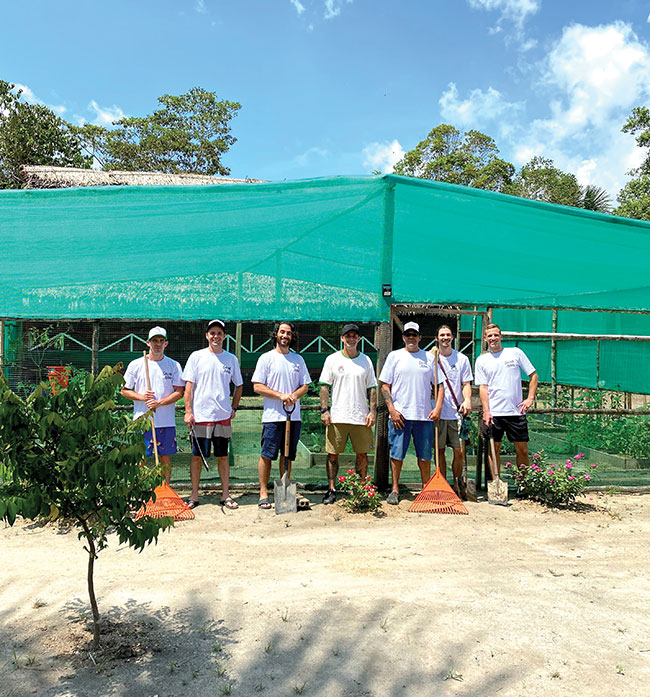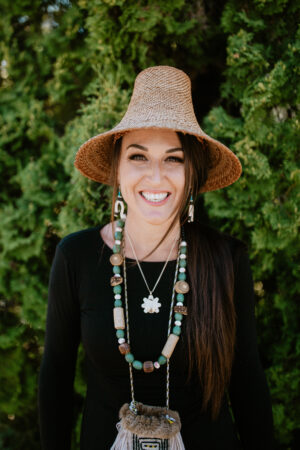
Features
Opinion
International
Psychedelics
Respecting Indigenous authority in psychedelics
When ancient tradition meets modern medicine, who gains?
October 19, 2023 By Devon Scoble
 Sacred Rebels Recovery, Iquitos, Peru, is a permaculture-based retreat centre for men struggling with addiction
Sacred Rebels Recovery, Iquitos, Peru, is a permaculture-based retreat centre for men struggling with addiction Disclaimer: Devon Scoble is a British-descended Canadian writer living and working on the traditional lands of the Mississaugas of the Credit, Anishnabeg, Chippewa, Haudenosaunee and Wendat peoples. She is grateful for the Indigenous knowledges reflected in this piece and acknowledges any misconstrual of those perspectives as entirely her own.
A lot can change in eight years. For Sapha, a Persian-Canadian Vancouver Islander who goes by his first name, it’s the difference between days focused on scoring and using alcohol, opiates and stimulants and days devoted to helping others overcome their addictions to those same substances.
“In the throes of addiction” for 16 years, he no longer takes what he calls hard drugs or alcohol. But he does credit the psychedelic drug ayahuasca as a medicine in his healing journey, even though it wasn’t offered at any of the early recovery programs he attended.
“Being a recovering addict and working with psychedelics is very controversial. Most 12-step fellowships and self-help groups are abstinent-based and see psychedelics – even with a therapist – as using drugs,” he says. But in 2015, a conversation with a counsellor at a holistic recovery centre in Saskatchewan gave Sapha the courage to explore an intuition.
“I told her how I viewed plant medicines as sacred tools for going deeper,” he says.
“And she said, ‘Whatever you do when you leave here, don’t let anybody tell you that that’s wrong. If you’re working with psychedelics in your recovery and doing it with care and guidance and the proper people in your corner supporting you, then there’s nothing wrong with that. Just check in with yourself and your intentions and go forward with that in a good way.’ And so, that’s what I did.”
His recovery journey would lead him through a degree in social work, and, eventually, to becoming a co-founder of Sacred Rebels Recovery, an ayahuasca-assisted addiction recovery retreat in Iquitos, Peru.
Ancient wisdom meets modern medicine
Humans have understood the transformative power of psychedelics for centuries, but Western clinical practitioners largely ignored the predominantly Indigenous plant medicines until the last century. Stories like Sapha’s are increasingly gaining the attention of the mainstream, and across the world, hundreds of clinical trials are underway, studying various psychedelic compounds’ potential to treat depression, PTSD and addiction, fibromyalgia, migraines and more.
The future of psychedelic medicine is exciting, but history is often obscured in the rush to understand these drugs and their clinical applications. It’s a familiar story in Indigenous communities and begs some questions.
When traditional healing meets modern, for-profit medicine, who benefits? And who should benefit?
N’alaga of N’alaga Consulting
Truth and reconciliation in psychedelic medicine
Truth and reconciliation in Canada has been a bumpy road, and for many non-Indigenous people, a process of unlearning whitewashed histories and reconceptualizing their role in the lands they call home.
Evidence of unmarked graves in Canadian residential schools is “changing the narrative that most people grew up learning about,” says N’alaga, a Haida and Kwakwaka’wakw land-based cultural empowerment facilitator and the founder of N’alaga Consulting.
“A lot of people are learning about ongoing impacts of colonial genocide, residential school abuses and missing and murdered Indigenous women for the first time, and they’re quite horrified this was not part of what they learned in Western education systems.”
N’alaga runs and develops allyship workshops for non-Indigenous folks and land-based, culturally-rooted healing programs for Indigenous people. Psychedelics aren’t part of her offerings, but she uses them for her own healing. She has a personal understanding of their potential, and professional advice for anyone who wants to work with them.
“Ayahuasca, peyote and psilocybin are medicines that grow in Indigenous territories,” she says. “For the people who belong in these territories, it’s part of their culture, way of life and connection to the land. If you’re a non-Indigenous person engaging in these practices, the most important thing is to be guided by someone whose culture it belongs to.”
Since access to Indigenously-centred psychedelic healing can be hard to come by – especially in legal, clinical settings – at the very least, she’d like to see reciprocity from anyone who consumes traditionally-Indigenous medicines or their chemical analogues, and especially from anyone who researches or profits from them.
“If I could send a message to anyone in that realm, it would be, ‘How are you giving back to the communities that medicine comes from?’”
A model built on respect
Back in Iquitos, Sapha offers recovery coaching and mentorship for Sacred Rebels Recovery participants. A practising curandero, which loosely translates as shaman or medicine man, Sapha also prepares them for ayahuasca ceremonies. He doesn’t work alone. Maestro Ricardo Amaringo is a Shipibo curandero master, and Sapha’s mentor. Maestro Ricardo taught Sapha how to ask the ayahuasca for guidance, and he blesses and supports Sapha’s continued work with Shipibo traditions on Shipibo land.
Sapha is mindful that his efforts benefit the local community. He also volunteers at the centre’s permaculture program, which provides local employment and food share programs and nurtures Shipibo medicinal plants, especially ones facing extinction. He also encourages participants who can afford treatment to pay it forward and donate so that a local in need can also attend ceremonies.
“What Sapha and his team are doing is appropriate,” says N’alaga. “They’ve been guided and taught and invited by people whose culture these traditions belong to.”
Sapha and N’alaga give the same advice to non-Indigenous people interested in psychedelic medicine: ask your practitioners how they were trained, if they received blessings from the medicine’s Indigenous communities of origin and what they are doing to give back to those communities.
“Whether it’s done in a Western tradition or South American or any other tradition, at the end of the day what comes first is the ability of the person suffering to experience relief and to experience qualified help and support,” says Sapha. “So I think it’s really up to practitioners to acknowledge the history of the plants, whether it’s psilocybin or ayahuasca or any other medicine, and be part of educating the patient on its origins and history and how they’re working with it in integrity.”
Print this page
